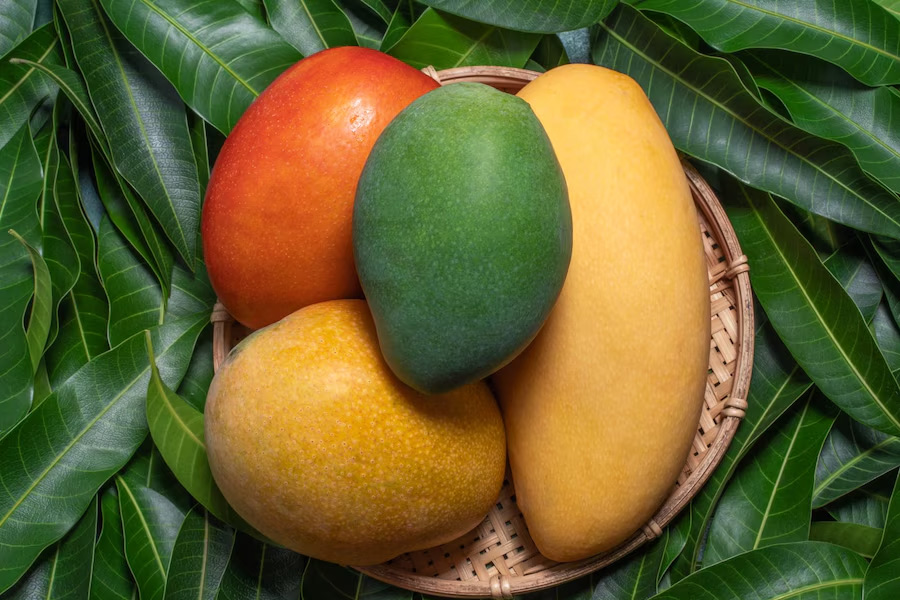
One of the most loved things about the summer season is the availability of mangoes. Mango is a tropical fruit that is not only delicious but also packed with numerous health benefits. It is also called the 'king of fruits' and is well known for its sweet, juicy flesh and vibrant flavour. On this National Mango Day, we list the various types available and highlight the health benefits they offer.
Table of Content:-
Nutritional Profile of Mangoes

Mangoes are a powerhouse of essential nutrients. According to US Department of Agriculture (USDA), one cup of sliced mango, roughly 165 grams, offers:
- Calories: 99
- Protein: 1.4 grams
- Carbohydrates: 25 grams
- Dietary Fibre: 2.6 grams
- Vitamin C: 67% of the Daily Value (DV)
- Vitamin A: 10% of the DV
- Folate: 18% of the DV
- Vitamin E: 9% of the DV
- Vitamin K: 6% of the DV
- Potassium: 6% of the DV
Mangoes are also rich in antioxidants, such as beta-carotene and polyphenols, which play a significant role in protecting the body against oxidative stress and inflammation.
Also Read: Can Eating Mangoes Cause Acne? Here's What The Dermatologist Says
Types of Mangoes

Here are some popular types of mangoes:
- Alphonso (Hapus): Alphonso mangoes, known as the 'King of Mangoes,' are loved for their creamy texture and sweet, fragrant flavour. They are mostly grown in the Ratnagiri region of India.
- Ataulfo: Also known as the 'Honey Mango' or 'Champagne Mango,' this variety is smaller and has a buttery, non-fibrous flesh. It is predominantly grown in Mexico.
- Haden: Originating from Florida, Haden mangoes are bright red with green and yellow undertones. They have a sweet, slightly tangy flavour and a firm texture.
- Kent: These mangoes are big and oval with dark green skin and a red blush. They’re known for their sweet, juicy flesh and low fibre content.
- Tommy Atkins: Tommy Atkins mangoes are commonly found in supermarkets. They have a fibrous texture and a mild flavour, making them popular for commercial products because of their long shelf life.
- Kesar: Another popular Indian variety, Kesar mangoes are saffron-coloured and have a sweet, intense flavour. They are primarily grown in the state of Gujarat.
Also Read: Here’s Why You Should Soak Mangoes Before Eating
Health Benefits of Mangoes

Mangoes offer a plethora of health benefits, making them a valuable addition to any diet. Here are some key advantages:
- Boosts Immunity: Mangoes are rich in vitamin C, crucial for a strong immune system. This vitamin helps White Blood Cells (WBCs) production, which fight off infections and diseases.
- Supports Eye Health: The high levels of vitamin A and beta-carotene in mangoes contribute to good vision and prevent eye conditions like macular degeneration and cataracts. A 2017 review indicates that zeaxanthin (an antioxidant found in mangoes) may help protect eye health and potentially prevent damage associated with macular degeneration, an eye condition that deteriorates with age.
- Aids Digestion: Mangoes contain enzymes, such as amylases, which break down complex carbohydrates into simple sugars, aiding digestion. The dietary fibre in mangoes also helps prevent constipation and promotes a healthy digestive tract.
- Promotes Skin Health: The vitamins and antioxidants in mangoes can improve skin health by reducing acne, hydrating the skin, and promoting collagen production, which maintains skin elasticity.
- Heart Health: Mangoes are great for your heart because they’re packed with potassium and magnesium, which help keep your blood pressure in check. Also, the fibre and antioxidants in mangoes help lower cholesterol, reducing your risk of heart disease.
- Anti-Cancer Properties: Mangoes are packed with polyphenols, which have been shown to help fight cancer. These compounds reduce oxidative stress and inflammation, which can contribute to cancer. According to a 2016 study, polyphenols can help guard against oxidative stress, a harmful process that is associated with various types of cancer.
[Disclaimer: This article contains information for informational purposes only, hence, we advise you to consult your own professional if you are dealing with any health issues to avoid complications.]
Also watch this video
How we keep this article up to date:
We work with experts and keep a close eye on the latest in health and wellness. Whenever there is a new research or helpful information, we update our articles with accurate and useful advice.
Current Version